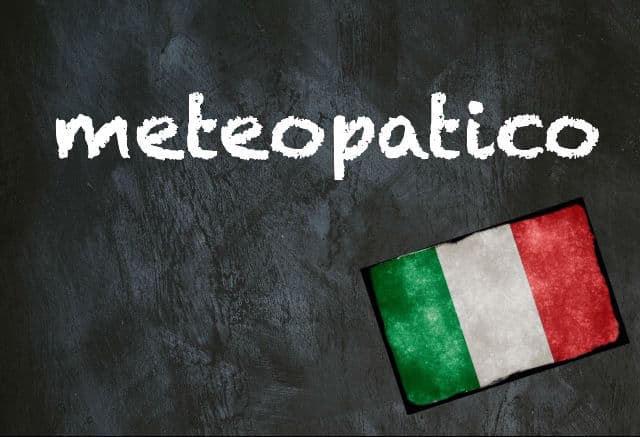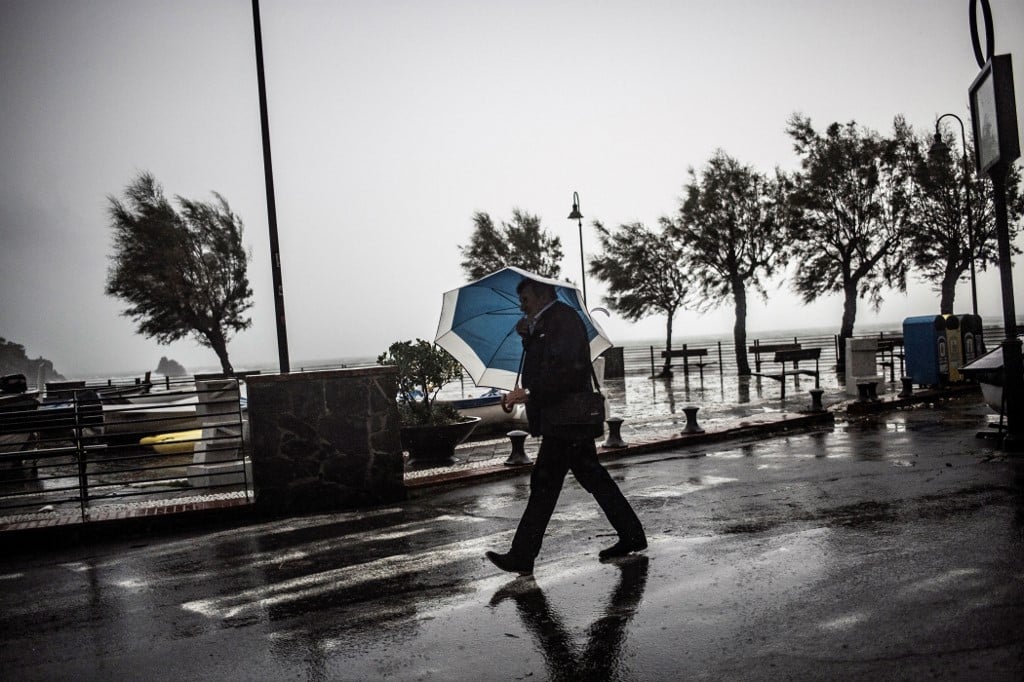Italian word of the day: 'Meteopatico'

This word might not be in the dictionary, but it could come in useful if the winter weather gets you down.
In the depths of winter in Tuscany, when the days were short and cold, and all I wanted to do was hide under the duvet, my slightly exasperated Italian husband looked at me and said "ma, tu sei meteopatica."
This adjective doesn't translate into English, but I got the message - I was affected by the weather, no doubt about that.
From under a pile of blankets, I grumbled: “Is that even a real word?”
It turns out I'm far from the first person to ask that question.
You may not find meteopatico/a/i/he in the dictionary - but it definitely exists.
It’s proper, dictionary-listed equivalent is meteoropatico. But, since that’s a bit of a mouthful, part of it often gets skipped in spoken Italian.
Both variations are so commonly used that even the Italian language guardian, the Accademia della Crusca, is a little reluctant to go as far as to say one form is actually more correct.
But whichever version you use, it's a very useful word to know.

When you definitely don't feel like going for a walk. Photo: Marco Bertorello/AFP
We have a lack of specific adjectives for this in English - even if (in the UK at least) we might have far more suitable weather in which to use them.
Yet in English, the closest thing we have is the phrase "winter blues", or we might have winter depression or seasonal affective disorder.
But we don't say we're "winter depressed", or "weather affected".
The Italian word came from the Greek ta meteora (meaning ‘celestial phenomena, things above’) and patheia (‘suffering, feeling’)
It’s easy enough to use it in Italian conversation – just as you would any other adjective. Following the verb essere and changing the ending (o/a/i/he) depending on the noun you’re describing.
For example:
Francesco è molto meteopatico.
Francesco feels really down in bad weather
Se sei meteopatico, una giornata grigia può farti sentire giù di umore.
If you're affected by the weather, a grey day can put you in a low mood.
It can also be used as a noun:
I meteopatici sono sensibile ai cambiamenti di tempo
People who get the winter blues are sensitive to changes in the weather.
(Obviously, without a direct adjective equivalent for meteopatico we have to improvise a little and change the sentence structure.)
With winter weather setting in here in Italy, I hope you won’t need to use the phrase ‘io sono meteopatico/a’ anytime soon.
Do you have an Italian word you'd like us to feature? If so, please email us with your suggestion.
Comments
See Also
In the depths of winter in Tuscany, when the days were short and cold, and all I wanted to do was hide under the duvet, my slightly exasperated Italian husband looked at me and said "ma, tu sei meteopatica."
This adjective doesn't translate into English, but I got the message - I was affected by the weather, no doubt about that.
From under a pile of blankets, I grumbled: “Is that even a real word?”
It turns out I'm far from the first person to ask that question.
You may not find meteopatico/a/i/he in the dictionary - but it definitely exists.
It’s proper, dictionary-listed equivalent is meteoropatico. But, since that’s a bit of a mouthful, part of it often gets skipped in spoken Italian.
Both variations are so commonly used that even the Italian language guardian, the Accademia della Crusca, is a little reluctant to go as far as to say one form is actually more correct.
But whichever version you use, it's a very useful word to know.

When you definitely don't feel like going for a walk. Photo: Marco Bertorello/AFP
We have a lack of specific adjectives for this in English - even if (in the UK at least) we might have far more suitable weather in which to use them.
Yet in English, the closest thing we have is the phrase "winter blues", or we might have winter depression or seasonal affective disorder.
But we don't say we're "winter depressed", or "weather affected".
The Italian word came from the Greek ta meteora (meaning ‘celestial phenomena, things above’) and patheia (‘suffering, feeling’)
It’s easy enough to use it in Italian conversation – just as you would any other adjective. Following the verb essere and changing the ending (o/a/i/he) depending on the noun you’re describing.
For example:
Francesco è molto meteopatico.
Francesco feels really down in bad weather
Se sei meteopatico, una giornata grigia può farti sentire giù di umore.
If you're affected by the weather, a grey day can put you in a low mood.
It can also be used as a noun:
I meteopatici sono sensibile ai cambiamenti di tempo
People who get the winter blues are sensitive to changes in the weather.
(Obviously, without a direct adjective equivalent for meteopatico we have to improvise a little and change the sentence structure.)
With winter weather setting in here in Italy, I hope you won’t need to use the phrase ‘io sono meteopatico/a’ anytime soon.
Do you have an Italian word you'd like us to feature? If so, please email us with your suggestion.

Join the conversation in our comments section below. Share your own views and experience and if you have a question or suggestion for our journalists then email us at [email protected].
Please keep comments civil, constructive and on topic – and make sure to read our terms of use before getting involved.
Please log in here to leave a comment.